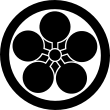- Ofudesaki (Tenrikyo)
-
This article is about the term "Ofudesaki" in the context of Tenrikyo. For other uses, see Ofudesaki (disambiguation).

Beliefs and scripture Tenri-O-no-Mikoto
Ofudesaki
OsashizuPractices Joyous Life
HinokishinPeople Oyasama (Miki Nakayama)
Izo IburiPlaces Tenri, Japan
Tenri University
Tenri Hospital
Oyasato-yakataThe poems provide instructions for returning the human mind to its "original, pristine condition", also known as "returning to the origin", "single-hearted salvation", "the mind of a three-year-old child" or "the mind like clear water". The instructions involve using whatever means necessary to provide "a step-by-step return to the 'original condition', in ways that are appropriate to the time, place and spiritual maturity of all human beings". This strategy finds basis in that methods were originally to be appropriate for 19th-century villagers living in Yamato; each person being taught according to their need and level of understanding.
The Ofudesaki also provides for the training of Intermediaries, or "Timbers"; those responsible for the interpretation and proliferation of the Ofudesaki's material and content.
The Ofudeseki has only recently been available in the Western World. During the hypernationalist years of the 20th century, the poems were all seized and suppressed by order of the then Japanese government, and Tenrikyo, was, by order of the government, made into a Shinto Sect. After World War II, Tenrikyo was able to openly preach its practices and has since spread globally.
Categories:- Tenrikyo
- Religious texts
- Japan religion stubs
- Japanese literature stubs
Wikimedia Foundation. 2010.
Look at other dictionaries:
Ofudesaki — (おふでさき) is Japanese for the tip of the brush . It was a term used in the 19th century to indicate automatic writing and thus is the name of the holy texts of two shinshukyo. Ofudesaki (Tenrikyo) Ofudesaki (Oomoto) This disambiguation page lists… … Wikipedia
Tenrikyo — (; Tenrikyō , lit. Teaching of Divine Reason ), is a panentheist Japanese New Religion. Tenrikyo is estimated to have about 2 million followers world wide with 1.5 million of those in Japan. Due to various similarities and some historical… … Wikipedia
Tenrikyō — Tenrikyo Haupttempel in Tenri. Die Stadt Tenri war vor dem Tenrikyo noch ein Dorf mit dem Namen Shoyashiki Tenrikyō (jap. 天理教) ist eine relativ junge, monotheistische Religion, die aus dem japanischen Shintōismus hervorgegangen ist. Miki Nakayama … Deutsch Wikipedia
Tenrikyo — Dieser Artikel oder Abschnitt bedarf einer Überarbeitung. Näheres ist auf der Diskussionsseite angegeben. Hilf mit, ihn zu verbessern, und entferne anschließend diese Markierung … Deutsch Wikipedia
Священные писания — Священные писания основополагающие тексты какой либо религии. При определении Священного писания берутся исключительно письменные тексты, устная традиция не учитывается. Священные писания, как правило, ссылаются на своё сверхчеловеческое… … Википедия
Osashizu — Part of a series of articles on Tenrikyō Beliefs and scripture Tenri O no Mikoto Ofudesaki Osashizu … Wikipedia
Oyasato-yakata — Tenri University Sankokan Museum, an example of the oyasato yakata architecture The oyasato yakata (おやさとやかた) complex is a collection of buildings in Tenri City, Nara, Japan. that form an incomplete square 872 metres (2,861 ft) on each side… … Wikipedia
Tenri-kyō — Dieser Artikel oder Abschnitt bedarf einer Überarbeitung. Näheres ist auf der Diskussionsseite angegeben. Hilf mit, ihn zu verbessern, und entferne anschließend diese Markierung … Deutsch Wikipedia
Nakayama Miki — In this Japanese name, the family name is Nakayama . Nakayama Miki (中山 みき?, June 2, 1798 – February 18, 1887) was the Japanese foundress of Tenrikyo who is worshiped by that religion as the Shrine of God the Parent.[1] Tenrikyo is, arguably, the… … Wikipedia
Mahikari — is a Japanese new religious movement (shinshūkyō), with a number of variants or offshoots, founded in 1963 by Yoshikazu Okada (岡田 良一) (1901–1974). The name Mahikari means true light in Japanese, being a compilation of the words ma (真 – true) and… … Wikipedia
